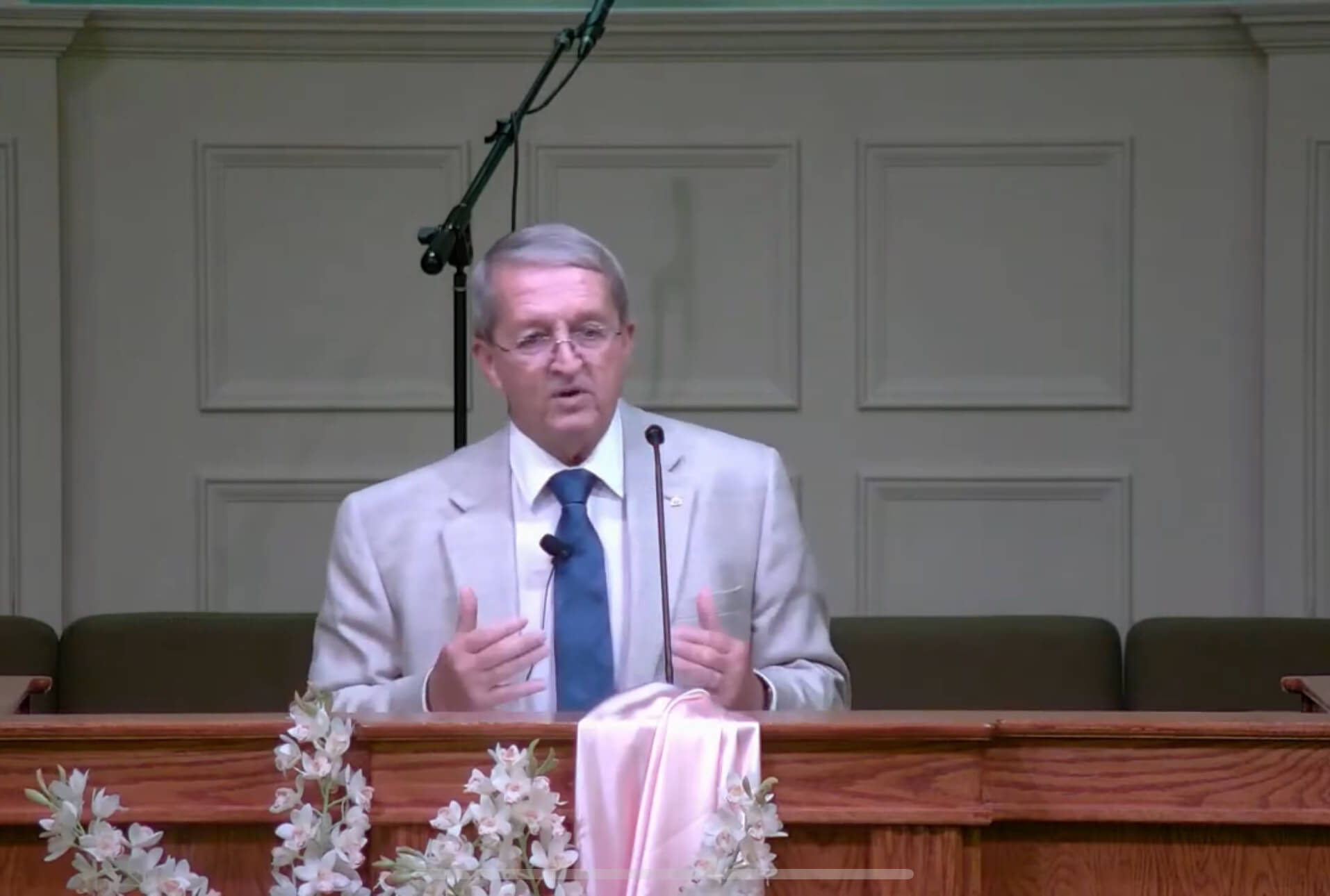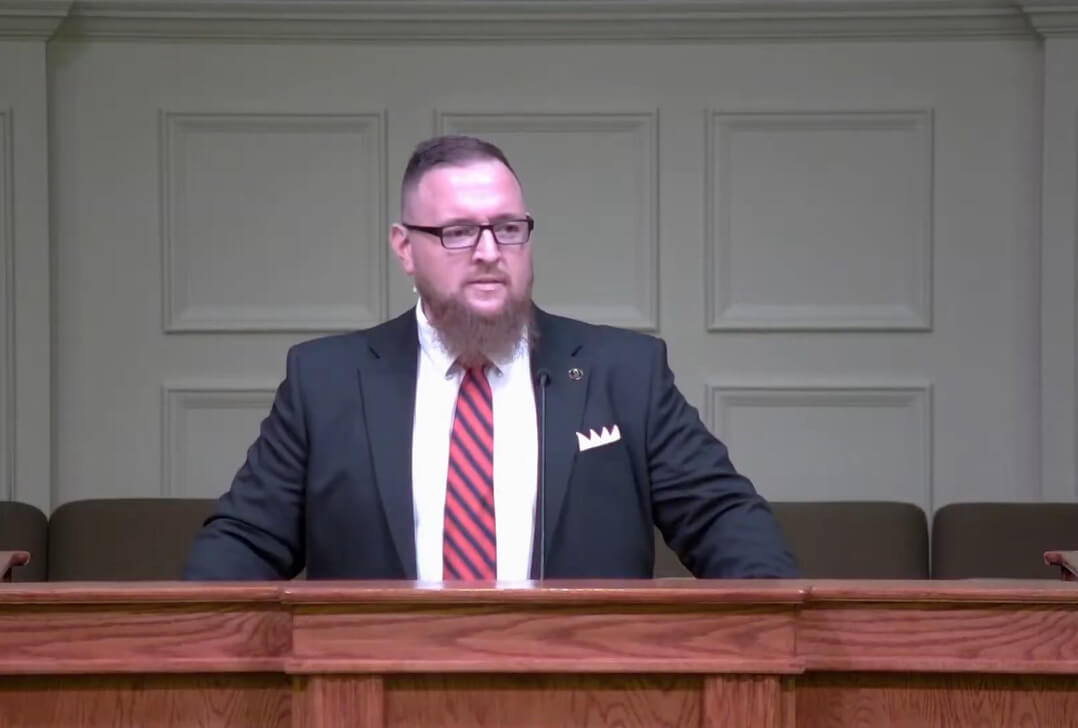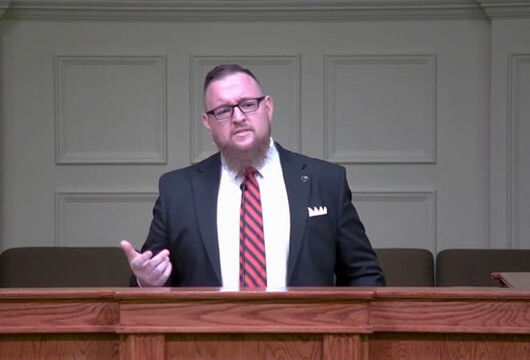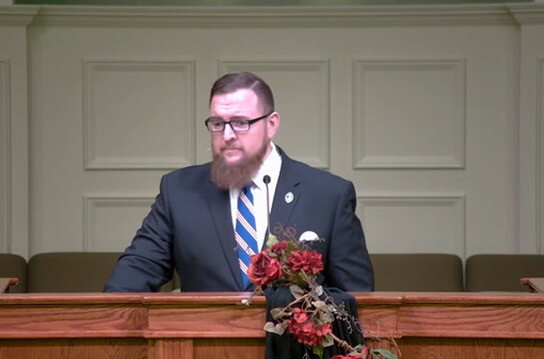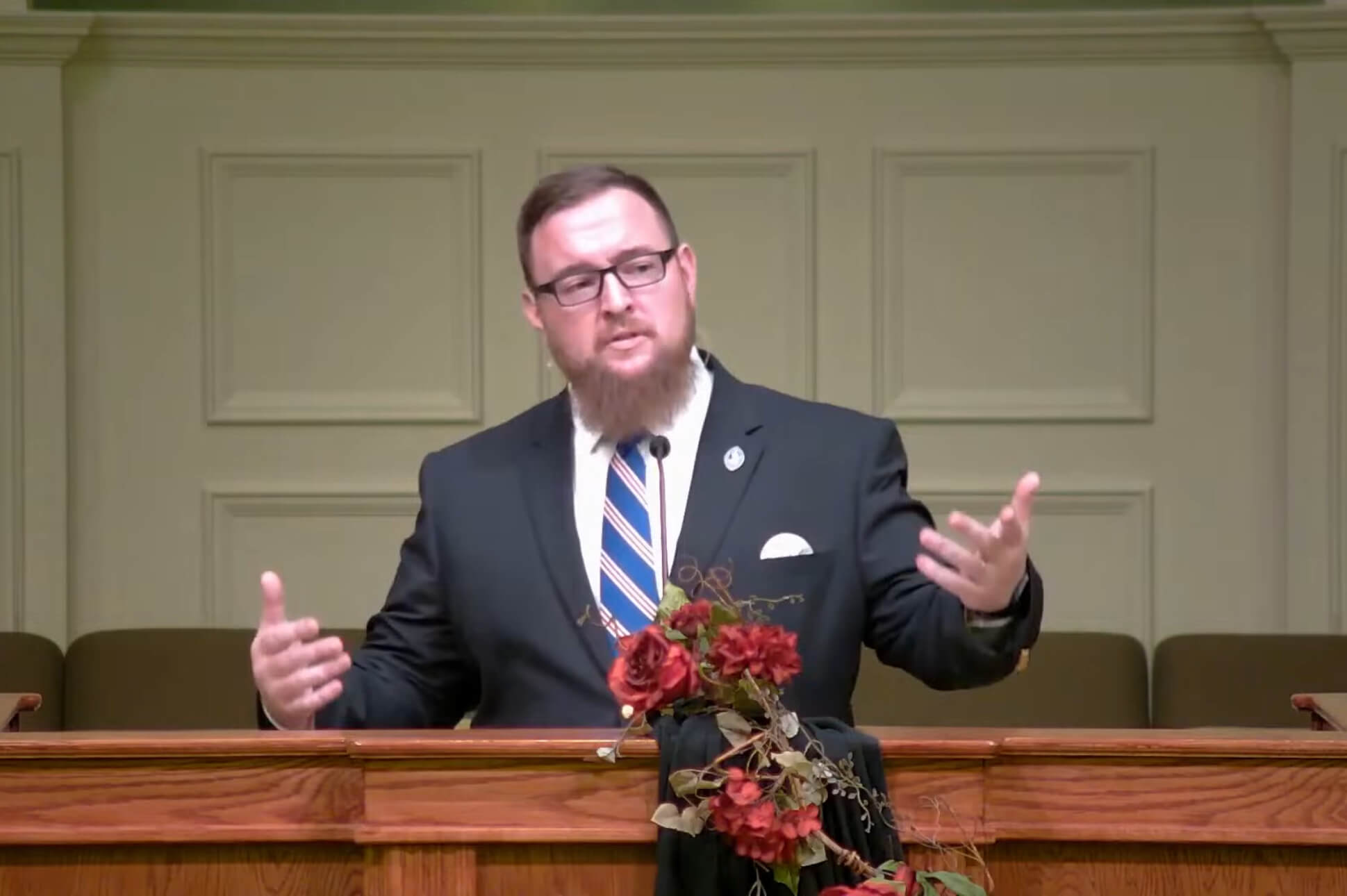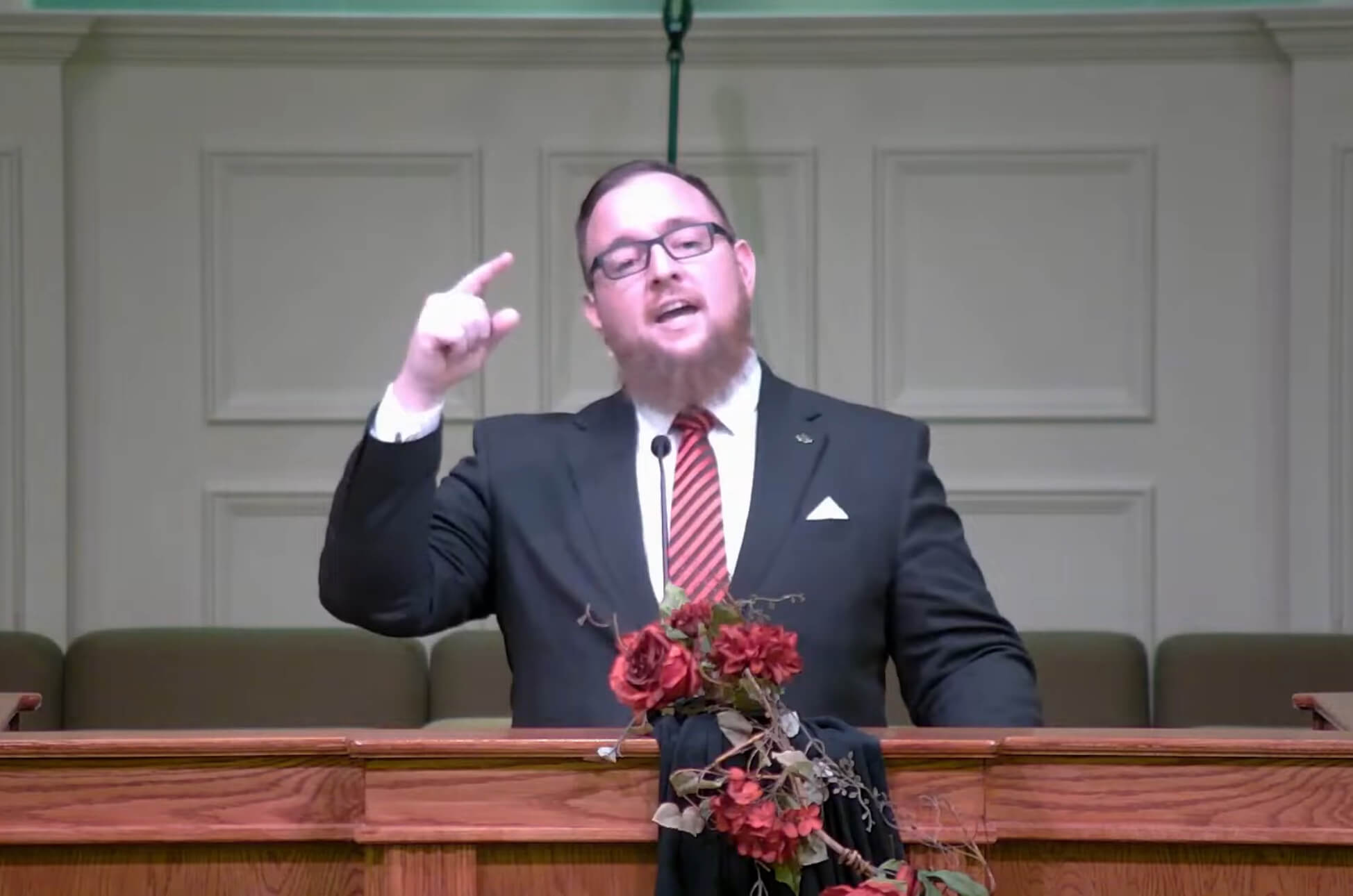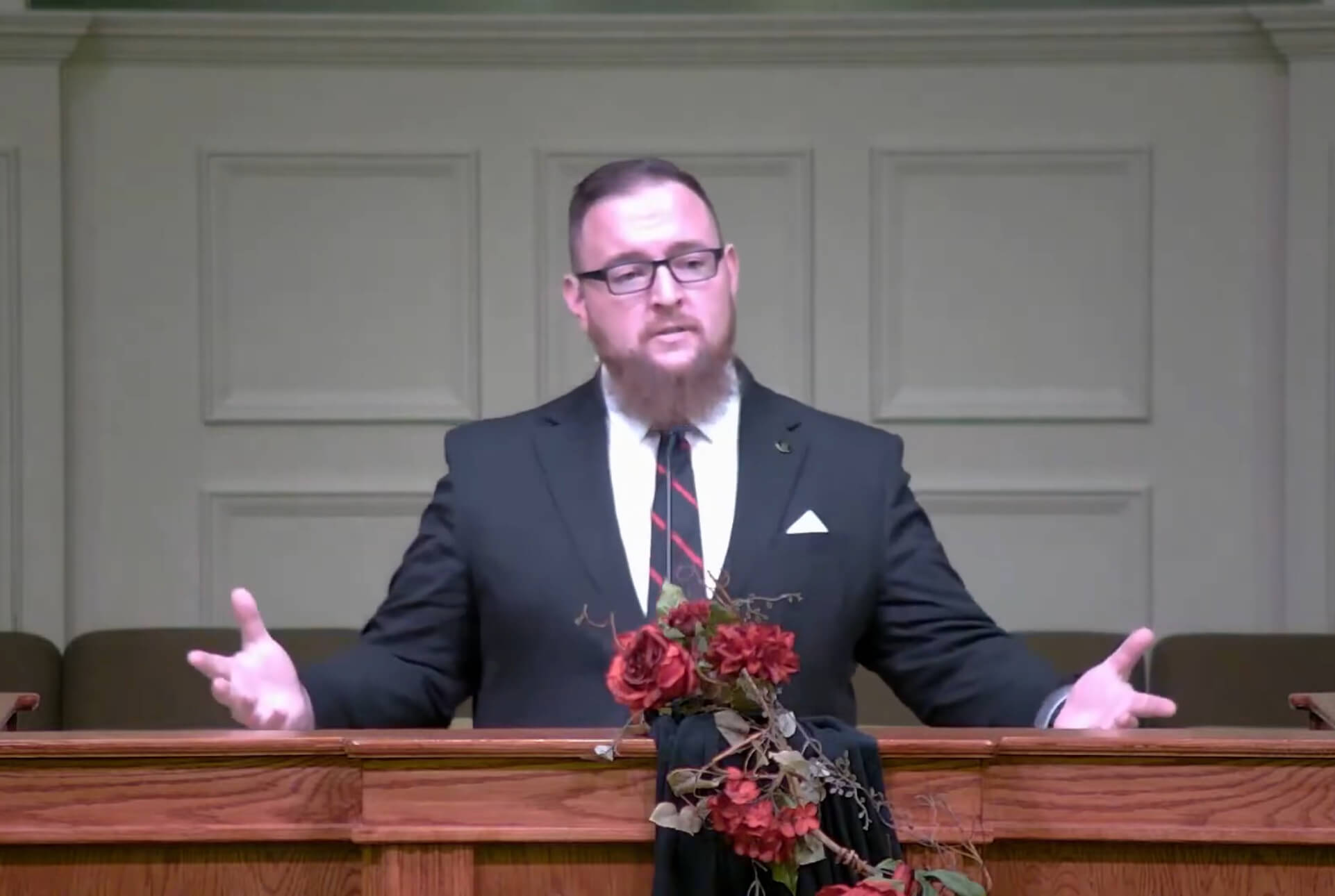Video
“The Great Commission”
Matthew 28:19-20
Pastor Richard C. Piatt, II
05/12/24
Audio
Transcript
Well, this evening, we are going to turn once again to the Gospel of Matthew, Chapter 28 and Lord willing this is our conclusion to this particular book. We kind of hit chapters 27 and 28 by way of pictures. Some of that was helpful because of the holidays that we went through and to be able to have an Easter message at Easter as we would get through that. But to look at them as Matthew was giving us that revelation, truth, knowledge, history concerning Christ and the crucifixion and burial, resurrection and so forth. And even down to the stories as far as the greatest lie ever told and we’ve seen that.
Tonight what I want to do is, some of you know that I have several hobbies, most of them, not all, refer to animals and or plants. But I do have another hobby, one that is limited but yet very special, and that is I like to collect Egyptian things. And so that is a replica, obviously, but it’s a replica of Tutankhamen and his death burial mask. He was the boy pharaoh and his tomb was raided. And therefore we can pick up a lot of different things and knowledge about ancient Egypt and so forth. And I collect Egyptian artifacts and things like that just because I find it immensely interesting to think of Moses being considered the son of Pharaoh’s daughter and was taught all the different stuff that the Egyptians believed yet he didn’t believe it. that he identified with the nation of Israel. But he knew, he had a good secular education, but he knew all those things, but he rejected all of it. And I just enjoy seeing some of those things. And so this is one of my smaller ones because the bigger one, I didn’t quite have a bag big enough to bring it here, plus it’s really heavy.
And so, but this is the one that is considered the full color. and it’s painted and it’s had glorious gold on it, not just gold paint. But I have a larger one, it’s almost life-size and it’s solid, well, it’s painted solid gold. And when they would bury people, they would, it was a big deal and he would have several head coverings that was placed. One was solid gold, the original was solid gold. We had the opportunity to go to Chicago back in the seven, 70s probably, yeah 70s, could have been 1980 but when it was up in Chicago and we went there and saw the original and it is utterly amazing. I suppose that was the beginning of my falling in love with Egyptian stuff but and there were a lot of things like if it has a cobra, this particular one has a cobra and then a separate, it’s a a raptor that’s supposed to represent, I think, Horus, one of their gods. And they all are told about different things. But because they were buried with all kinds of artifacts that they believed in the afterlife, that there were chariots, there were chairs, there was all kinds of things buried with King Tut, or Tutankhamen, that they could use in the next life. But if you go to the tomb right now, it’s empty. Now the empty tomb of Tutankhamen. has no comparison to the empty tomb of our Savior, the Lord Jesus Christ. Because you see, at least they had archeologists that raided that tomb, and now they’re all in pieces throughout, I think throughout, but they’re mainly found in Cairo at a special museum. But if you go to where he was buried, it’s empty.
Well, that same sort of thing and the fact that if you remember that we were told in the scriptures how that the scribes, the Pharisees and the hypocrites were told that the body was no longer in the tomb, that of the Lord Jesus. And they said, we will give you lots of money and you just tell the lie. His disciples came and stole his body. Now the reason why I mention all of that is because in our text, the broader text which I did not go into this morning, that It adds a little bit of what Matthew was trying to convey as he was going to wrap up his gospel.
Now, I’ve already shared with you that I have to confess that my preaching through the gospel of Matthew, I have just come to so appreciate the gospel just for its literary value. I know that it’s the word of God and it’s inspired, but it’s put together extremely well. In fact, it was John MacArthur who wrote these words. Failing to understand this closing passage, one misses the point of the whole gospel and of the entire New Testament. That’s a big wowie zowie, because this is a very long gospel. And we’ve been in it for years. I was going to go back and check, ran out of time, but we’ve been in it a long time. And he’s saying you can understand it, know the whole gospel, but really lose sight of the fact of why did he end it up this way? Why did he? To miss this is to miss The closing passage is one will miss the whole point of the whole gospel and for the fact that it is represented throughout the whole New Testament. You’ll miss out on the whole New Testament.
So what is it that becomes so important in that particular thing? And tonight, what we’re going to do is look at four absolutes in what we call the the the Great Commission. But in the broader context, there is a setup with respect to all of it. Now, we come to Chapter 28 and we have this announcement that now at the Sabbath, at the first day of the week began to dawn that Mary Magdalene and the other Mary came to see the tomb. And behold, there was a great earthquake and the angel of the Lord descended from heaven and came and rolled back the stone from the door and he sat on it. His countenance was like lightning and his clothing as white as snow and the guard shook for fear and became like dead men, meaning they fainted. I like this rendering, became like dead men. But the angel answered and said to the women, I get it, the women didn’t faint, but the angel’s talking to them, says, do not be afraid for I know that you seek Jesus who was crucified.
Now, again, in the literary layout, if you didn’t know, like if you didn’t have the rest of the conclusion of the gospel on the next page, if you just left it there, you might think that we’re gonna have at least one more chapter probably after all of this, but it is rapidly coming to an end. So every phrase and every lay of the land or the lay of the passage, he’s building to a crescendo. He’s building to the climax, to the point, the pinnacle of the entire thing. Notice what he says, but the angel answered and said, women, do not be afraid. Now, he says, you’ve come to see Jesus because you seek Jesus who was crucified. He is not here, for he is risen. Now this has got to be going through their mind just as he said. He taught them. And Matthew has pointed that out. And as we’ve gone through, I point out every time, he’s like, I got to go to Jerusalem. Peter, no, don’t go, don’t go.
Well, OK, well, let’s all go and die with him. And then, you know, in all of this, and he says, and they’re going to do the mockery of the trial. They’re going to kill me. But on the third day, I’m going to rise from the dead and everything. So there’s a lot. It’s not just a lot, it’s the whole kit and caboodle of Christianity is on is on the line here, because if he has not risen, as he said on the third day, let’s go all, you know, rent and let’s all go fishing. Let’s all just forget about this church stuff. And he says, the one you seek. He is not here, the one Jesus who was crucified, he is not here, for he is risen, as he said, that’s important. The words of Jesus are important while he was teaching, but did they believe him? Some, but they had a hard time. Come see the place where the Lord lay. The tomb was empty. And go quickly and tell his disciples that he is risen from the dead. Indeed, he is going before you into Galilee. There you will see him. Behold, I have told you.” And remember, we’ve seen throughout the entire book the word behold, this message, the resurrection.
This last chapter is just so important. So they went out quickly from the tomb with fear and great joy, and they ran to bring his disciples word. And as they went to tell those disciples, behold, Jesus met them saying, rejoice. So they came and beheld him by the feet. And notice these words, they worshiped him. They were Jews. You worship no one but God. He was a righteous Jew, God-man, and he received their worship. So what is the response that Matthew wants us to get basically from the fact that Jesus is risen? Well, one is rejoice. Brethren, we have a living Savior. He’s in the world today. We have a living, for you know, all I have is Christ, but he is all I need. And we should be joyous in the fact that we have a risen Savior. Now that’s important because we know what the Great Commission’s gonna say. But it’s to rejoice, but not only to rejoice, it’s to worship him. We are obligated to worship Him, not to party with Him. That’s why worship is serious business. How we worship, how worship is conducted should have a serious note to it. It should, but it’s gonna have to have, and that’s what we’re gonna find in the Great Commission, it should have, well, baptism being one, but it has a teaching element, teaching the whole counsel of God.
And that is the point, so we rejoice, we worship, we’re gonna teach, make disciples, we’re gonna be going. So they worshiped him. Well, I’m gonna slip over to kinda jump ahead of ourself just a moment, but go over to verse 16. Then the 11 disciples went away into Galilee to the mountain, which Jesus had appointed for them. And remember, he said that’s where he was going, and they wanted to go see him. When they saw him, what did they do? They worshiped him. So the right response, because the resurrection is real, is worship. We worship a risen savior. Well, let me go back now over to verse 10. Then Jesus said to them, do not be afraid. Now, why would he say that?
He would say that because they were afraid. Just calm down. Don’t be afraid. notice the word go and tell My brethren to go to Galilee and there they will see me and when they saw him they worshiped him Now while they were going behold some of the guard came into the city reported the chief priest all the things that had happened when they assembled together They gave a large sum of money to the soldier saying tell them his disciples came at night and stole him away while we slept in other words They could not deny The empty tomb. But grave robbers didn’t come and take him away, and there was no gold there. There was no reason to break in and to steal for material wealth. But if you remember, yeah, they went and the scribes, Pharisee hypocrites, and the leaders, religious leaders, they had gone to Pilate and said, put a guard there. and make sure because he said he was going to rise in three days. And so his disciples will probably come and try and take him away.
And then if you remember there and at this time it goes on and it says tell them while while we while you slept. And if this comes to the governor’s ears we will appease him and make you secure. So they took the money and did as they were instructed and they could put a period. Matthew could have ended the sentence there but he didn’t. And this saying commonly reported among the Jews till this day. So we’re at the point now as he I mean we’re almost at the end and and he’s still kind of making a roll on on the resurrection and the historicity of it all and and Jesus had some ten appearances maybe a more to his disciples, some individually, some on the road to Emmaus. You had Jesus making appearance to 500 to his disciples. None of that really is important to what Matthew wants to convey. He conveys almost before the end and before he gives us the Great Commission He tells us about the story commonly believed until this very day. Well, what day was that? Well, it was the day of his writing. And when he wrote it.
Now, we don’t know when that was, but Jesus died probably around 30. It could be anywhere from 30 to 33. I will be broad and say 30 to 35 A.D. early in the first century. But Matthew was writing this, it could have been, again, I know what different ones say, but if you take a broad span, 40, 50, 60, so it was written decades after the death, burial, resurrection, and ascension. And so he’s saying, into the church age, or after the ascension, I mean, Acts and so forth, and the gospel is being preached, and the gospel is spreading around the world, In the early days of the spread of the gospel and the growth of the church, the explosive growth of the church, people were still reporting that the disciples of Jesus had come and stole his Bible away, it was commonly believed.
Now, what kind of culture or atmosphere does that breed? Or what is it like? Well, I pull all of that out because of these next verses. It’s commonly reported among the Jews until this day, verse 16. Then the 11 went away into Galilee to the mountain, which Jesus had appointed them. And when they saw him, they worshiped him. Now, praise God, but that is not the end of the sentence. They worshiped him, semicolon, but some doubted. Now, it’s not necessarily that they doubted because of unbelief, but they got every Tom, Dick, and Harry, you know, Joe Blow in the neighborhood is just discussing all this stuff and his disciples are, no, I believe he rose from the dead. Well, I haven’t seen him. And so the disciples were assembling where Jesus has said, and this is the broad stroke of the pen when Matthew says, go to Galilee and be there and you will see him. They went and those who knew him, they saw him, they worshipped him. But not everybody. But it’s not antagonistic. They’re just doubting. They need an extra oomph. O church, arise and put your armor on.
You see, because the church is already expanding. Matthew, led of the Spirit of God, puts a gospel together. Luke has it to add to the certainty of your faith. Early Christians, even though they were so close to the day and age in which Jesus lived, there was this real, if they didn’t see him, Is he really alive? Did someone come and take his body, really? Tomb robbers were common in that day and age, not just in, say, in the Palestine area, but it was common in Egypt, a very wealthy country. And so there was a basis for the question of just because it’s an empty grave, that isn’t a good enough story to tell you that he’s risen from the dead. There were a lot of empty graves where there had been people. In fact, even when he died, if you remember in verse 51 of chapter 27, and behold, the veil of the temple was torn. In two, from top to bottom, the earth quaked, the rocks were split, the graves were opened, many of them, and many bodies of the saints who had fallen asleep, the dead people, were raised. And coming out of the graves after his resurrection, they went into the holy city and appeared to many things. People knew there were some things going, but empty graves is not enough just to prove it. Remember, those women saw an empty grave and an angel, but then they saw him. The resurrection was verified with a living body, not just an empty tomb.
And so Jesus says, go to Galilee, we’ll meet there, we’ll rendezvous there. And when they do, they see him, they worshiped, but some are struggling. Some are having a hard time. Well, what’s gonna happen next? Some doubted. It’s in that context, that conflict, we get the final words of the Gospel of Matthew. We refer to it as the Great Commission. These words were given to them. These words were given to us. To people who may, well, not be as strong in the faith. as what they should be. They’re in the faith, and they do worship. They see other people worship, and it’s okay. But we need something that is gonna really tell us what we’re to do, why, and how on earth are we gonna do it when we are opposed? Because let’s face it, opposition to the gospel came very, very quickly. Verse 18, and Jesus came, just as he said, He spoke to them saying, and what is the message? All authority is given to me in heaven and on earth.
Now, if that doesn’t put a rod of iron in your backbone, nothing will. The guy who is my savior, It has all authority, not just here on earth. He’s just not like a totally awesome president or prime minister. He is God incarnate. He has all authority given unto Him by His Father. And it’s not only here on earth. The angels bow to Him. Satan himself has to get permission to do anything. Because as a Jew, remember, it’s a Jew writing about a Jew to the Jews. They all get it. And they knew the book of Job. and the authority, when God spoke to Job and said, where were you when I created the world? Where were you when I? This is our Savior. This is our God. John’s gonna pick up, that’s the last gospel, and he’s gonna say, in the beginning was the Word, and the Word was with God, and the Word was God, such was in the beginning. And the Word became flesh and dwelt among us. And then at the end of the Gospel of Matthew, all authority, heaven and earth, complete sovereignty has been given unto him. So we’re in this context now and as we go through this it’s interesting. This is such a rich passage and you can preach it in several different ways.
Now I was taught that at Grace Theological Seminary that you outline do a grammatical analysis. I mean you know this is Greek so it reads like English and so you do it like for at least the older generation, we were taught how to diagram a sentence, and you’ve got your subject, your verb, your direct object, and everything that, you know, all the modifiers and what they do. And then what you do is then you graph it, and then you can take and build your outline. And then that way, that’s how you preach the text.
Now you can do that, but preaching long narrative texts, you can’t do that. So you look for a thought or you look for the logic of the passage and that’s a lot of how I construct it. But this particular passage lends itself to a lot of different ways. You can look at this according to the main verb when it goes on and says, when he says all authority is given to me in heaven and in earth, that would be a foundational thesis statement. Then he says go therefore. That’s an interesting word. It means in a sense having gone, I’m gonna come to that in a moment, But that is the main verb that regulates the others. But then you get participles like making disciples, baptizing, and teaching. And those are participles. And then you say, well, do you do it according to just the verbs or the participles and take those as your basic outline? Well, you can. Very much so.
Or you can, like I did this morning, because I didn’t know really how much time I would have, because I didn’t know how long baptizing eight people and doing baby dedications, how long that’s all going to take. And we just looked at the main issues of each one that is here. Well, tonight what I want to do is that I’m going to follow the line. A couple of preachers mentioned it. James Montgomery Boyce followed it, although I’m not gonna do his sermon, but I’m gonna take his lead, and the reason why I said four absolutes is because of the four references to the word all. All. And so I’m gonna let the text give us this, and as we come to this now, we’ve got the four absolutes when it says, first, all authority. Not most. not just equal to, but all authority is given to me in heaven and on earth. Now, I spent a lot of time this morning on that. We don’t need to do the same here today, but the term authority is the Greek word exotheia, and it means, in a sense, in this kind of a context, a freedom and the right to speak and to act as one pleases.
Now that’s using all nice words just simply to say, all authority equals I have complete sovereignty. He is the King of Kings and the Lord of Lords. He is ruling and reigning at the right hand of God Almighty. When he comes, he is the Savior, the ultimate one. When he comes back to earth, he’s going to come as a ruling king with all authority and all must bow. All the prophecies say in the book of Revelation or in references of the epistles, when they’re going to talk about the return of Christ, that’s why he’s riding the white horse. That’s why he is perceived with the one of being the ultimate ruler of all. Now, we all know and understand that.
Now I’m gonna point out, remember the context. Some come and see him and they worship. Some are a little bit standoffish. They’re a little bit hold off. Some are doubting. What is the message that Matthew wants to give to the early church to conclude this gospel? This Jesus that I’ve been telling you about that was preaching a Sermon on the Mount. This Jesus who towards the end of his ministry takes on the scribes, the Pharisees, and hypocrites and pronounces woe on them. Yeah, but they killed him. Yeah, but he rose from the dead. Some are doubting, some are not sure. There’s rumors. And they’re pointing to an empty tomb, but others say they stole his body. He appears. There’s faith becomes a sight. And he says, that is Matthew in writing, for those of us that believe without seeing, all authority is given unto this one. That’s why this is one of those absolute things. All authority is given unto him. It’s complete. It’s in heaven and on earth.
That’s necessary, and as I mentioned this morning, because we wrestle not against flesh and blood, but against principalities and powers, against spiritual wickedness in high places. We’re involved in a spiritual warfare. I heard a joke, someone saying that Satan was coming and so forth, and was tempting this believer, and he said, but the believer just didn’t win. And he says, aren’t you afraid of me? He says, no. God is my Father, and Jesus is my Savior, and He is authority over you. Silence. Resist the devil, and what does he do? Flees from you. That is a promise that the church needs. Arise, O church, and put your armor on. What do we have to fear? We’re coming to a day and age where with the secularism of this world and what’s going on within our own government, that I think that our faith is gonna be challenged more and more. And there’s gonna be a lot of scared Christians.
Beloved, we need to remember, our Savior has all authority. He doesn’t say he’s gonna keep us from bruises. He doesn’t even say he’s gonna keep us from death. But we do get that glimpse in the book of Revelation in chapter six about the souls under the throne and the picture that is there. How long, O Lord, faithful and true will it be before you avenge our blood? And he says, don’t worry, there’s a few more that are gonna have to die, but I’m gonna get them. There is final reconciliation. We need not fear death. In the Gospel of Matthew, Fear not man for what he can do to you, but rather fear him who after death can cast you into hellfire.
You see, we need the right perspective. The church needs to have the right perspective. The Gospel of Matthew is to show us the humanity of Christ. It shows us his deity as well. But it culminates in the fact that with the very verification of his death, burial, resurrection, even back then, some doubted some waiver and they needed one final oomph. And what was that? All authority is given to me in heaven and in earth. And it’s complete. Now secondly, the second absolute in this, it’s interesting and it comes to the all. It says all authority has been given to me in heaven and earth. Go therefore and make disciples of all nations. Go therefore and make disciples of all nations.
Now isn’t it interesting that the Jewish guy writing about a Jewish guy to a bunch of Jewish people in the nation, he’s wrapping it up and notice where he goes to the Gentiles, the ethnos, all the ethnic groups and the worldwide. Jesus didn’t go worldwide. Well, let me put it this way. Jesus goes worldwide through us. That was the early church. And in the final commission, that’s where we get this. But it’s all nations. I don’t think that that is by mistake. Take with me, if you would, to Matthew chapter one.
Now we know that the gospels, not all of them, but the synoptic gospels give us a lineage, a genealogy. Well, which one, which genealogy does Matthew have? Well, chapter one, verse one, the book of the genealogy of Jesus Christ, the son of David, the son of, there you go, Abraham. Abraham begot Isaac, and Isaac begot Jacob, and Jacob begot Judah, and so forth. Okay, so he goes back to Abraham. Well what is, what makes Abraham such a big deal to the Jews? Well he is a big deal. He should be a big deal to us too as far as I’m concerned. I don’t think we as dispensationalists give him a fair enough shake. But turn with me to the book of Genesis chapter 12. Genesis chapter 12 and the first Abrahamic covenant. when God, in the first 11 chapters, is talking about worldwide events, whether it be the Tower of Babel or it be the flood of the world and all of that. But in chapter 12, we’re having the sovereignty of God being emphasized because he chose a man. And that choosing of a man, Abraham, that is going to ultimately flesh out into a nation, ethnic nation.
But it says in chapter 12 verse 1 now the Lord had said to Abraham Get out of your country and from your family and from your father’s house to a land that I will show you and I will make you a great nation and I will bless you and I will make your name great and you shall be a blessing and all that is true Romans at all I will bless those who bless you, and I will curse him who curses you. But notice what this says. And in you, all the families of the earth, all the peoples of the earth shall be blessed.
So Abraham, in his genealogy, wants to say, okay, let me tell you about where Jesus comes from. He comes from King David, he’s a Jew. But because of that, he also comes from Abraham, And the blessing of Abraham and his descendants is going to be worldwide. We can read in the other prophets that Israel was always the light to the nations. They never really lived up to that. The church now is to be the blessing to the nations and the preaching of the gospel. And so we find out. He says, now, I have all authority, and I’m giving you some instructions. I want you to go and to teach and to baptize those participles. But I want you to do this to all nations.
The main verb, matheteo, is the central command to all of it means to teach others, to make them believing and learning. All the nations that are found. Matthew is coming full circle to chapter one. And when we are to go actually that is a word that means he’s assuming that we’ve gone when you have gone or having gone. Baptize. Make disciples rather baptizing those disciples and teaching those disciples. They were the ones that were to be involved in the spread of the gospel.
Well, we have all authority being pointed out. We’ve got to all the nations being pointed out, but notice what he says, go therefore and make disciples of all the nations, baptizing in the name of the Father, Son and the Holy Spirit, teaching them to observe, and here’s the word again, all, or all of his commands, all the things that I have commanded you. He’s now saying, Christ is risen. He has all authority. He has told you to go to all the nations. He’s told you what to do with them. Go, make disciples, baptizing, which is a verification that they’re truly disciples, and teach those disciples.
Well, what are you supposed to teach them? See, he keeps going. This is the climax. I want you to teach them. his commands. Teach the whole counsel of God. Teaching them to observe all things that I have commanded you. Don’t just teach them the doctrines of grace. Don’t just teach them about baptism or about giving or about teach the whole council. Some have said it, put it this way, teach the whole council of God, like the five solas as they were boiled down during the Reformation. The importance, teach them the importance of the word of God, sola scriptura. We have one source of authority. It’s found in scriptures and scriptures alone. If you wanna know what truth is, you gotta teach him about the scriptures.
There was a story told, I don’t remember who the liberal was, but he was one who did not believe in the doctrine of inspiration. But what he said was, he said, whenever I argue with a fundamentalist who believes in the inspiration and inerrancy of scripture, I quietly in my heart admire him because he has a source of authority that I ultimately cannot shoot down. You see, we have the word of God given to us by the one who has authority in Christ. And we’re to teach the whole of scripture. It’s not opinion, it is truth. And so it’s Sola Scriptura. We need to teach the truth about saving faith. about how that faith is alone given to us by God. The sovereignty of God. That it is in grace alone, not a work of man. That it is found in Christ and in Christ alone.
I was hinting at that this morning when I just said that. When we say that there’s no other name given among men whereby we must be saved. Or when Jesus said, I am the way, the truth, and the life. No man comes unto the Father but by me. This world says, you’re a bunch of narrow-minded bigots. You know, really, I don’t care what the world says. But I am narrow, I don’t think I’m a bigot. But I am narrow, but I believe Jesus is narrow. But I’m narrow because Jesus is narrow and I will hide behind the man who has all authority in heaven and in earth. The early church needed that because the pagan society in which the church was birthed needed the backbone to stand up against the false gods, the false teachers, the pagan rulers, the politicians of the day. It really isn’t that much different from today. And they needed his commands.
All authority, all nations, teach them all the commands that I have given unto you. You know, that was actually part of my call to the ministry in the Book of Acts, chapter 20, verses 25 through 31, where Paul calls for the Ephesian elders and meets them there in Miletus, and he says, I am free from the blood of all men, for I have not shunned, of all men, for I have not shunned to declare unto you the whole counsel of God. That’s our job. as a local church, as Christians, as Christianity was going to spread around the world. It deals with we do it with all authority. We do it to all the nations. We do it with all of his commands, realizing that we have to preach the whole counsel of God. And then the final all in the translation, it’s kind of lost, but it’s there teaching them to observe all things that I have commanded you and Lo, I am with you always, or in all times. The presence of the Holy Spirit and the presence of Christ in the church is no less today than it was on the day of Pentecost. Now, it’s manifested differently. His presence, and lo, I am with you. I’m with you in all times. I’ll be there in the early church. I’ll be there in the dark ages.
You know, that’s the only real reason why we still have truth today. If you consider how bad off the church, some of this, the dumb stuff that they have done throughout historical church history. One wonders how the church has ever made it to this point. Well, I’ll tell you why. Because His presence is with us. And we need to be reminded of that. And again, this morning I mentioned that. It’s there especially during a baptismal service, but it’s here if you were not having a baptismal service, where two or three are gathered, there am I in the midst, that there is the manifestation of the presence of Almighty God whenever God’s people meet, His Word is preached, the Spirit is moving. Decisions made or resisted, the spirit is still working and his presence is here. That’s what makes a church service so important. Because he has promised us he will never leave us nor forsake us. And that one, that reality should temper how we worship, who we worship. and the strength in which conviction and commitment really enters here. Church is not just a fancy religious club.
It is when God’s people gather together in the midst of the presence of Almighty God, who has called us together with all authority. We can do this and all the nations are to do it. We follow his commands. Isn’t what he said, if you love me, keep my commandments. And he has promised us he will never leave us nor forsake us. We are empowered by him. His presence is here. And I think, too, there is an element of and lo, I am with you always, even to the end of the age. There is a word of protection. He’s here. If someone comes in and wrecks havoc, he doesn’t leave, and he’s here. There is protection for all of us. All of these concluding words have a sense of urgency. They are an imperative. Orizo Church, we need to be involved. And there’s a sense of stark reality.
I was shocked when, you know, I read a lot of different commentaries and that, and obviously one that I’ve already quoted him today, and we love him around here, and that’s John MacArthur. And in his commentary on Matthew, I have to confess I was a little bit shocked at how he ended his commentary. He closed with an illustration.
This was his illustration. He said, how many years ago we had a missionary that was a missionary to a primitive pagan society. And this missionary came and was sharing with them and said that they had they went there and they preached and the missionary’s wife led a young lady to the Lord. Praise God to all nations, all tribes and everything that was cool. And this young lady, after she was baptized, she talked to this woman and she said, I wish you would have come sooner so my little boy could have heard the message and he could have been saved. Well, wanting to know, you know, just what happened to the little boy, the mom said, well, why? Why is he not here? The mom said, A few weeks before you came to us, I offered him up as a sacrifice to the gods of our tribe. Period, end of commentary. I thought, wow. No comment.
You see, there’s an urgency. There’s an urgency because this world does not know Christ. And we do not have an excuse not to go and tell others. This morning we saw the imperatives. Tonight we see the importance of it all. A local church, God’s people, we have a commission. We need to be about doing it. To the praise, honor, and glory of our saving God. We have a closing hymn that’ll kind of express it all.
Let’s pray. Our Father in heaven, thank you. Thank you for giving us instructions and not just to, well, to be happy with the truth that we know and that we hear at church and to lose it all within our society or within our church, but rather we are to go out and tell others. Father, some countries that is against the law and your children pay dearly for it. In our country, we still have the freedom. May we not be lax in exercising our freedom to go and tell about a risen Savior who has all authority and he’s the only way of eternal salvation. Bless, we ask, in these final words of song as we pray in Jesus’ name, amen.
